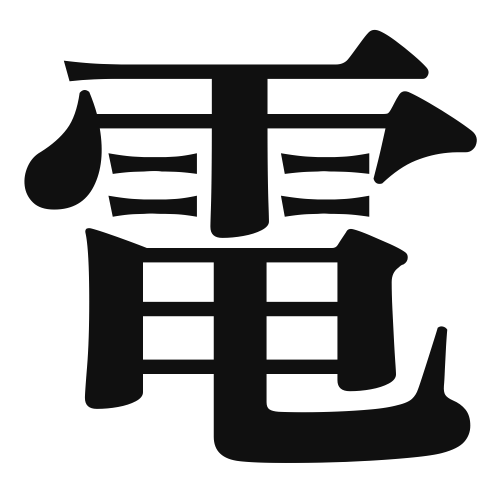1. Overview of Meaning
The kanji “電” (den) means “electricity” or “electric.” It is commonly associated with anything related to electrical energy, such as devices, power, and light.
2. Formation and Radical
Formation of the Kanji: The kanji “電” is a phonetic compound (形声文字), which combines the elements of “雨” (rain) and “田” (rice field). The “雨” component suggests a connection to natural phenomena, while “田” contributes to the phonetic aspect.
Radical: The radical for “電” is “雨,” which is often associated with weather and natural elements.
3. Examples of Usage
Common Words and Phrases: Some frequently used words that include “電” are:
- 電気 (denki) – electricity
- 電車 (densha) – train
- 電池 (denchi) – battery
Example Sentences in Daily Conversation:
- この電気はとても強いです。 (Kono denki wa totemo tsuyoi desu.) – This electricity is very strong.
- 電車は何時に出発しますか? (Densha wa nanji ni shuppatsu shimasu ka?) – What time does the train leave?
4. Synonyms and Antonyms
Similar Kanji: A similar kanji is “光” (hikari), which means “light.” While both relate to energy, “光” specifically refers to visible light, whereas “電” refers to electrical energy.
Opposite Kanji: An antonym could be “無” (mu), meaning “nothing” or “absence,” as it represents the lack of energy or electricity.
5. Cultural and Historical Background
Connection to Japanese Culture: The concept of electricity has played a significant role in modern Japanese society, influencing technology, communication, and daily life.
Proverbs and Idioms: One common expression is “電光石火” (denkō sekkka), which means “lightning speed,” illustrating the swift nature of electricity and its impact on life.
